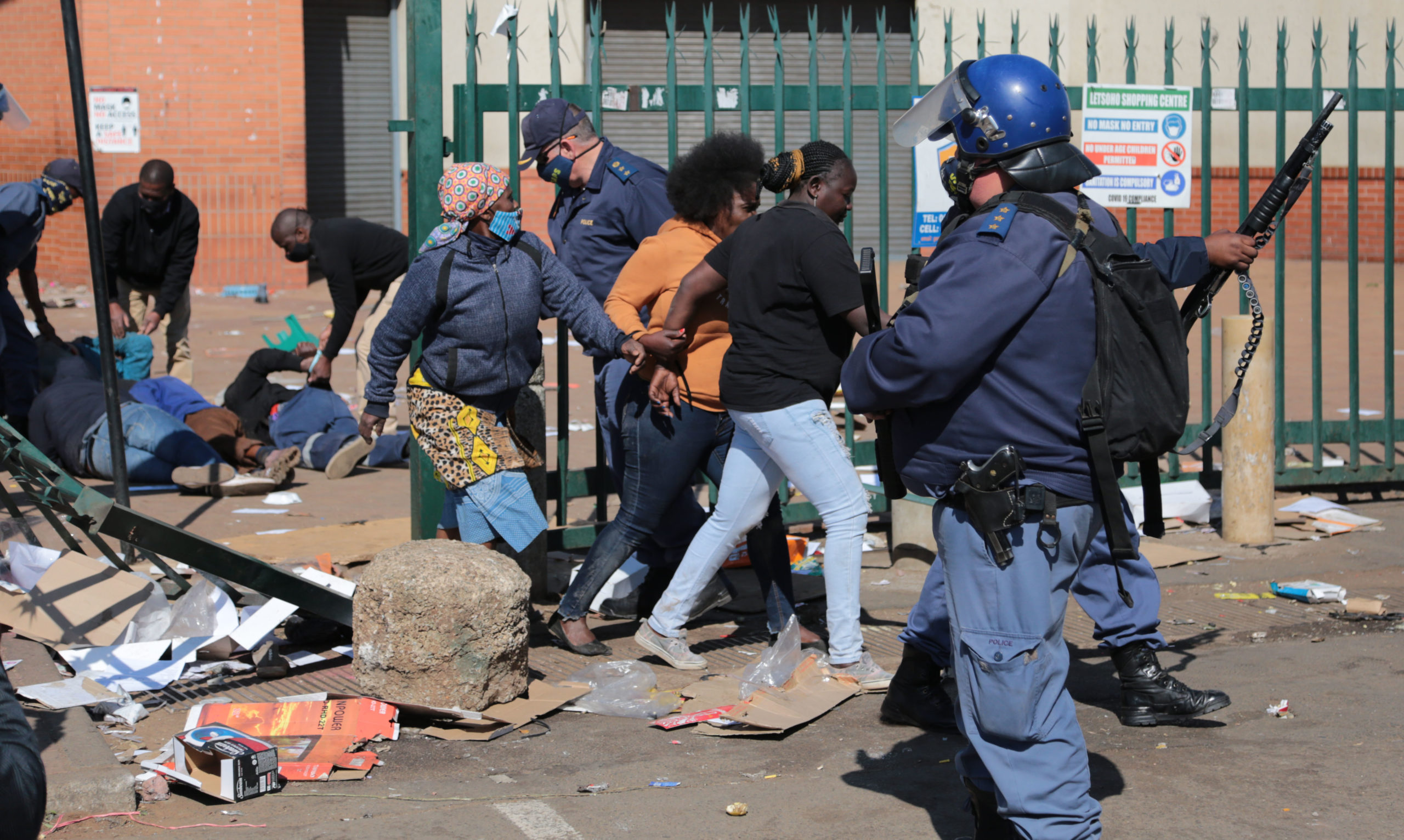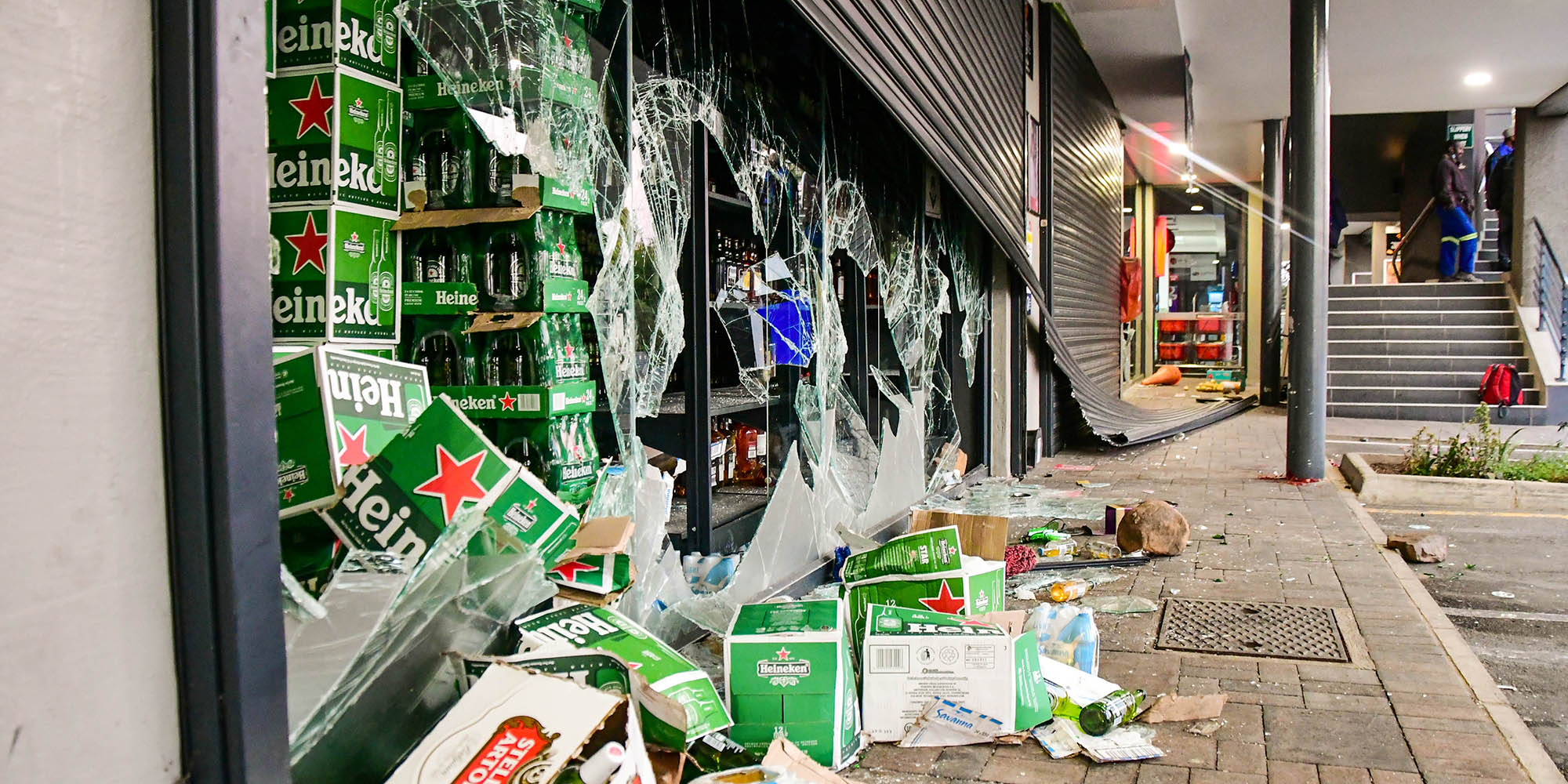AGE OF ANARCHY: ANALYSIS
Spark to a flame: Protests a sign of growing resentment to an unresponsive government, says ISS

Experts call on law enforcement and communities to share information as SAPS Crime Intelligence failures become glaringly obvious.
While South Africa has seen regular flare-ups in most areas in KwaZulu-Natal and Gauteng currently besieged by violence and looting, this time the public violence was not following “normal patterns”, according to Lizette Lancaster of the Institute for Security Studies.
The ISS has been monitoring service delivery protest hotspots through its Protest and Public Violence Monitor since 2013.
While data indicated that “potential RET strongholds” such as Alex, Denver, Katlehong and Cleveland in Gauteng and areas such as Reservoir Hills in KZN were sites of frequent protest, the danger existed now that similar hotspots in these provinces were at risk of igniting, said Lancaster.
While calls to free former president Jacob Zuma from prison might have been the driving inspiration behind initial protests, these had begun to “morph”, she added.
“Growing inequality and absolute socio-economic despair and discontent with the government is a catalyst, as is the Covid pandemic and its devastating toll. This is growing resentment towards a non-responsive and corrupt government which is what people perceive it to be.”
Lancaster is the project manager of the ISS Crime and Justice Information and Analysis Hub and on Tuesday told Daily Maverick that one of the most pressing issues was for SAPS to begin working with Community Policing Forums, neighbourhood watches and other community organisations in order to share information and intelligence to prevent further death and anarchy.
Citizens, she warned, should also be guided by SAPS in order to prevent vigilante action which would inflame an already volatile situation.
In some violence-ridden areas in KZN residents and community members on Monday took to protecting towns and businesses themselves. Many were armed.
SAPS and communities needed to work together in light of the clear failure of the hollowed-out SAPS Crime Intelligence to predict the ongoing violence and looting. While some arrests have since been made, these have been after the fact.
The tinderbox lit soon after former president Jacob Zuma was hastened to the Estcourt correctional facility on 8 July.
However, said Lancaster, many of the areas where unrest has flared have been plagued by persistent protests over a long period of time.
Residents here were accustomed to “persistently airing their grievances” with public protest. Areas in the Joburg CBD too that have gone up in flames “often see conflict which results in xenophobic violence and there is evidence of this again”, said Lancaster.

Police arresting some of the looters following sporadic looting at Letshoho mall in Katlehong.Photo: Felix Dlangamandla/Daily Maverick
“What we are not seeing,” she added, “is that areas where we would have expected flare-ups, like the Free State and Mpumalanga, are not moving towards showing this type of support for public violence”.
What one could draw from this, she said, was that “although there might be incitement by supporters of the former president and his allies, you need another ingredient and this is absolute socio-economic despair and discontent”.
Looters, she added, were not always organised and protests contained a multitude of motives.
“There is always the criminal element. In some crowds, you are able to identify the instigators but then in the ensuing frenzy others might find themselves doing things they would never contemplate doing normally.”
What South Africans had witnessed, including live footage on national television of looters breaking into a blood bank during President Cyril Ramaphosa’s address on Monday night was sheer criminality.
“What we are seeing here are people just taking for the sake of it. There is a big difference between a gogo or someone taking food from shelves because they are hungry and people in expensive cars loading up stolen TV sets.”

A looted Spar Tops liquor store in Sandy Centre, Pinetown, on July 12, 2021 in Durban, South Africa. It is reported that a considerable number of shops and businesses were looted over the weekend following a wave of violent protests after the incarceration of former South African President Jacob Zuma. (Photo: Gallo Images/Darren Stewart)
There were always individuals who “break down the doors and then those who follow” she added.
A concern with regard to the consequences in the aftermath of the violence, cautioned Lancaster, was the potential opportunism of “organised crime” piggybacking on food and other shortages.
Near Nkandla, youths were already stopping vehicles on a national road and extorting money from motorists in order to pass.
The only way for SAPS to fill intelligence gaps in the security cluster at present, she said, was for station and area commanders to begin liaising with neighbourhood watches, community policing fora and other community organisations “whether in suburbs or townships.”
Social Development and Community development also needed to be drawn into plans, said Lancaster, to mitigate food shortages.
The current violence, she said, resembled that of 2015 in Tshwane.
“It begins with political contestation and then real need and despair fuels it.”
The ISS began monitoring public violence in 2013 in light of high levels of socio-economic dissatisfaction, persistent service delivery protests “and increased political contestation”.
In a 2018 paper, Lancaster noted that protests, demonstrations, strikes and political violence “can, if conditions are right, gradually turn into social unrest.”
This could take the form of peaceful, disruptive or violent demonstrations, strikes, and acts of political or civil violence.
“Ultimately, social unrest can be viewed as an expression of collective dissatisfaction with a political system,” she wrote.
Protest was therefore “a form of political participation. A society’s preference for the use of more conventional forms of political participation (such as democratic processes) can, over time, transform into unconventional political participation like violent protest or political violence.”
What was considered conventional across the world not only depended on the period in time in which it took place, but also on the geographic location, “and that particular society’s definition of what is socially acceptable”.
Experts have long warned that disrupting and violent forms of protest were becoming more acceptable in South Africa.
This week has indicated that how authorities respond to this biggest challenge South Africa and the ANC has faced since democracy will either begin to address the real and unacceptable conditions that face this country’s poor and desperate or plunge us all into further chaos.
The Zuma family has already cost South Africa enough. DM

















 Become an Insider
Become an Insider
“The Zuma family has already cost South Africa enough.”
They have broken us. They must face the full might of the law so we can truly move forward again.
This government is unresponsive because it is incapable.
The police force is incapable.
TheArmy is almost nonexistant and is incapable.
Capable people are not of a specific colour,culture, religion
Politics or class – they are people with experience, knowledge, training and expertise. These are the people who should be leading our country into the future, looking after all people of this country, planning and steering us into a better life. Vote for the right people based on their competency and we have a chance.
No Jane ! MBA (Trump Univ.?) Mantashe proudly told the commission of enquiry, ‘cadre’ deployment (people who are interested in their own/personal welfare), is the policy of the ANC , and by extension … that of most or all political parties. Remember that famous quip some time ago by a senior ANC official … “we did not join the ANC to remain poor !” You get into the senior positions and look after yourself by recruiting others with the false promise of doing the same for them !
For some some years I’ve felt that it was only a matter of time before we would end up in this state of chaos & anarchy. I’m just surprised that it’s taken so long.
It’s the inevitable result & the culmination of years of ANC misrule, industrial scale looting & brazen corruption. The primary goal being self-enrichment for the political elite, their families & their cronies, very much to the exclusion of the general population at large.
For far too long, those at the bottom of the pile have looked up the social ladder & seen those above them, all the way up to the top, feverishly engaged in an impudent orgy of looting & getting away with it. So why shouldn’t those whose futures have been stolen by their leaders, also not partake in some looting & theft? They’ve nothing to lose.
I can’t see how SA can ever recover from this, we’re too far gone.
Hiram,
It is extremely unfair to reduce this to poverty. For every 10 looters there are 100,000 extremely poor people that are NOT looters and who are shaking their heads as much as you are.
Why? Because they are decent people, not animals.
Johan I’m not for 1 minute saying that this is due to poverty or that it is poor people who are looting.
Please understand what I’m saying, this situation is borne out of frustration & anger with a government that doesn’t care about the people.
Look at the headline of this article- “Protests a sign of growing resentment to an unresponsive government….”.
The political elite has been too busy enriching themselves at the expense of the population at large, resulting in a complete failure of the State to deliver at many levels.
Many people get up every day & have nothing to look forward to, no work no opportunities, no hope, nothing! The majority of our population are worse off; massive unemployment (& that was the case even before COVID struck, it’s only got worse since), lack of opportunity, lack of service delivery, the list goes on & on…..
This is a prelude to the time (it will come) when the ANC lose the majority in a general election . Bo-Zimbabwe will be the new name. War lords and Tribalism because the ANC are too corrupt and ideologically incompetent to run a functioning state.
Maybe Onder Zimbabwe or Onder Zimbabwe’s thumb. I could swear that they have better leadership than us.